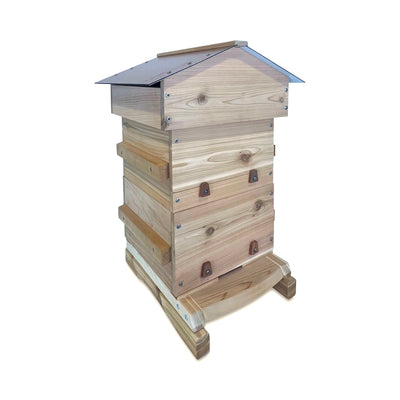Beekeeper Profile: Debbie Thomas | Mason Bee Maven
It seems like many communities have a mason bee ambassador—someone who adores and knows everything about mason bees. In our community, one of those people is Debbie Thomas.
Debbie is a Master Gardener and prolific mason bee keeper. If you want mason bees in our area, someone is sure to quickly mention Debbie. Learn her best tips and more about this Maven of Mason Bees below!
Bee Built: Can you tell us how you got involved with mason bees?
Debbie Thomas: I'm an OSU Master Gardener (MG) and outdoor enthusiast. We briefly studied mason bees in class, however I went on to also take a further in-depth mason bee class too. Then I went to a mason bee house workshop. By then I was absolutely hooked. Now, I sell cocoons, give lectures and also make mason bee houses. I'm known as Deb-Bee.
What do you love about keeping mason bees?
The whole process is exciting. I am their Mother! I watch them, I clean them, I store them, I anticipate their emergence in the Spring. They are so fun to watch! I am disappointed when the season is over. I absolutely get the most satisfaction when parents want to get a set up of bee cocoons from me, along with a house, so they can teach their children. The kids are the next generation and they want to learn about the importance of bees, especially ones that do not sting, like the mason bees.
"Think like a bee: Would you want to lay an egg in an environment infested with mites?"
When you are educating about mason bees, what do you find is the most common misconception or largely unknown fact about them?
Mason bees emerge at 55-60° F. People don't realize that and want to buy them in late March or April. That is too late. Mason bees need to be purchased in February or early March. Otherwise, it requires refrigerating the cocoons to cool them down but, unfortunately, that dehydrates the bees and reduces the viability of what is purchased.
What do you think is the most important step in caring for mason bees and helping them to remain successful?
Cleaning the bee cocoons. Every time a mason bee goes to a flower, it picks up pollen mites. Then, the bee goes into a nesting tube to lay an egg where it is also depositing the mites. The mites eat the food that is intended for the egg to feed on. So, cleaning your bee cocoons ensures a healthy bee population. It’s recommended to throw away bee houses that cannot be cleaned after 2-3 years. That’s because the entire house becomes infested with mites and the bees stay away from it. Think like a bee: Would you want to lay an egg in an environment infested with mites?
Best advice to would-be mason beekeepers?
They honestly take almost no care! You just put up a house. . . . and presto. . . they will come. You can make your own house or you can purchase one—what have you got to loose? It’s as much fun as watching a pair of little birdies use a birdhouse that you put up in your yard.






Leave a comment